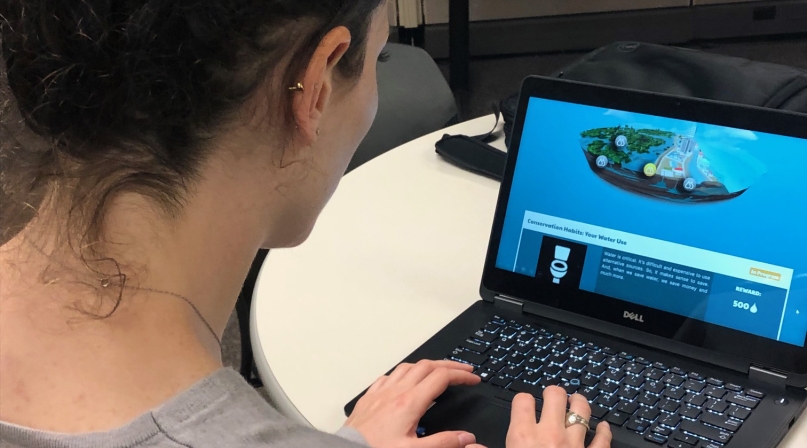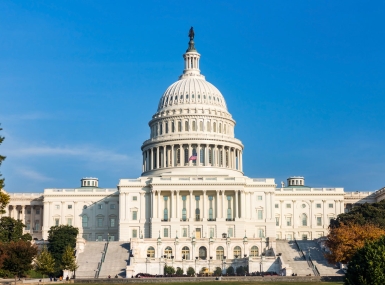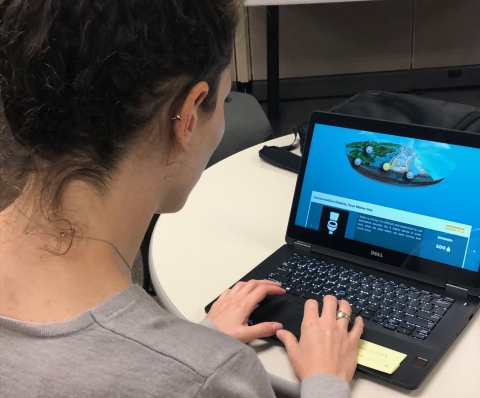Problem:
|
Communities face challenges finding new, innovative ways to engage the public and bring awareness to issues involving environmental sustainability.
|
Solution:
|
Use an online game to educate residents about water conservation, sustainability and climate change.
|
Friendly competition is bringing awareness to the importance of environmental sustainability in Broward County, Fla.
The southern Florida county created the Play Conservation Pays and Win! online game as part of a campaign to promote water conservation and teach residents about climate change and sustainability.
The game was developed as a way to promote the Broward Water Partnership, which brings together the county and 17 municipalities. The partnership focuses on water conservation through education, the distribution of free water-saving devices and rebates for high efficiency toilets.
Previous campaigns to promote water conservation and environmental sustainability involved contests or challenges, but kept reaching the same group of individuals who were passionate about the environment and water conservation, said Sam Baker, program/project coordinator for Broward County.
“We’ve always been trying to come up with new ideas, new ways to reach people to get a different audience,” Baker said.
The county is central to the water partnership and implements outreach efforts that typically involve media messaging and education, said Carolina Maran, Broward County Water Resource manager.
“We don’t want to have the same repetitive messages because it’s hard to achieve new audiences when we are delivering the same type of message,” Maran said. “We understand that promoting messages about conservation can be challenging.”
The county worked with an outreach consultant to create the Play Conservation Pays and Win! online game, which launched in 2019. The game lasted three months and attracted more than 1,900 active players.
When users log into the game with a username and password, a depiction of the water cycle of southern Florida shows users where water comes from and how it reaches the county. Those playing the game can answer questions in the sustainability, climate change and conservation categories.
The questions asked users about rebate programs, water conservation, water reuse, plants, ways to reduce greenhouse emissions and the ties between water conservation and climate change. Maran said her team developed the series of questions, tasks and activities for the game.
Once a user answers two to four questions in each category, he or she receives water “drops” as points. Players can then use the “drops” to flip cards that reveal instant-win prizes or watch one of 18 videos the county produced. The instant-win prizes included gym memberships, pool passes and even pavilion rentals, Baker said.
By watching videos, users received points, increasing their likelihood of winning cash prizes. One user received the grand cash prize of $5,000, two users received second place prizes of $1,000 and three users received third place prizes of $500.
The game was an effective way to educate the public about water conservation, Maran said, adding that she saw competition between users, even internally at the county.
Baker emphasized how the graphics in the game provided visuals to inform users about how water is obtained, how sea level rise is contributing to water issues and how climate change and water conservation are connected.
“We took a local lens on these issues,” she said.
The platform for the game is available at a discounted rate if the county wants to create a similar campaign in the future, Baker said. The county has the option to create new questions or new graphics to promote different topics.
“We have a lot of different programs within our divisions so it’s available for you in the future for other campaigns or other types of promotions,” she said.
The game was promoted on social media through Facebook, Twitter, Instagram, YouTube, email blasts and the Conservation Pays webpage. Maran said the county saw an increase in social media activity whenever they posted about the game.
“We thought this was a unique way and a positive approach,” she said. “We were truly investigating all different resources and all different avenues where we can talk with people about the challenges that we see here on our daily basis.”
Baker added that the online game is a new way for local government to use innovation to be on par with the private sector.
“This right here is a completely new way for the public to get involved and not feel like they’re being bombarded with information; rather, they’re being rewarded for getting this information,” she said.
Maran said she feels people are interested in learning about these issues through different ways, such as playing a game on the Internet.
“I think the message is truly being innovative every year and finding different fun ways to share your message and get the attention from your community,” Maran said.
Play Conservation Pays and Win! is the recipient of a 2019 NACo Achievement Award in the County Resiliency: Infrastructure, Energy and Sustainability category.




